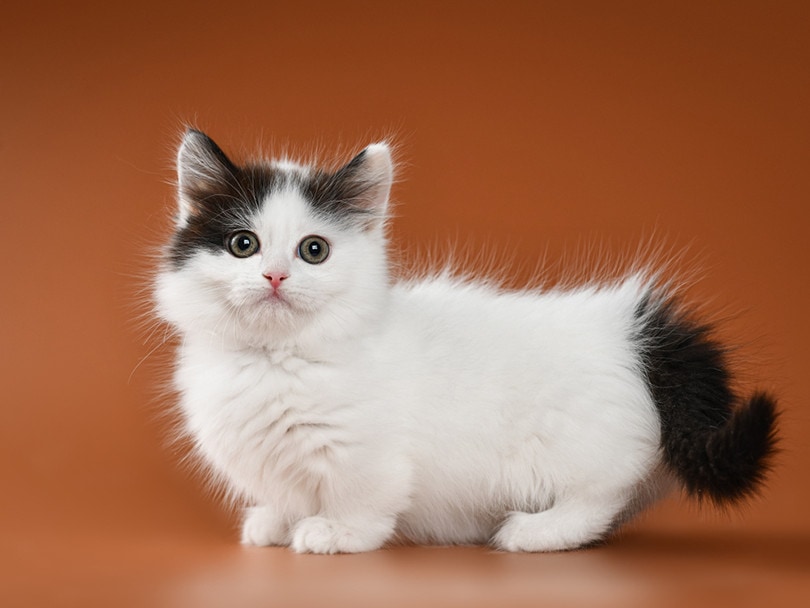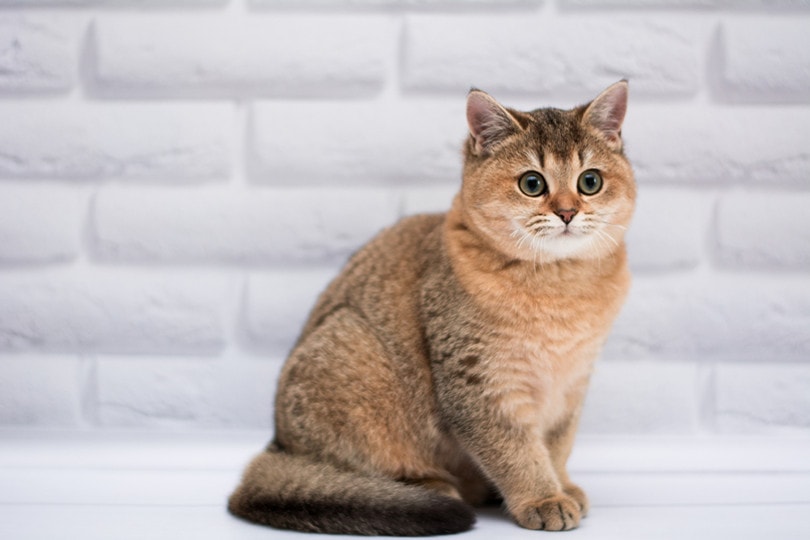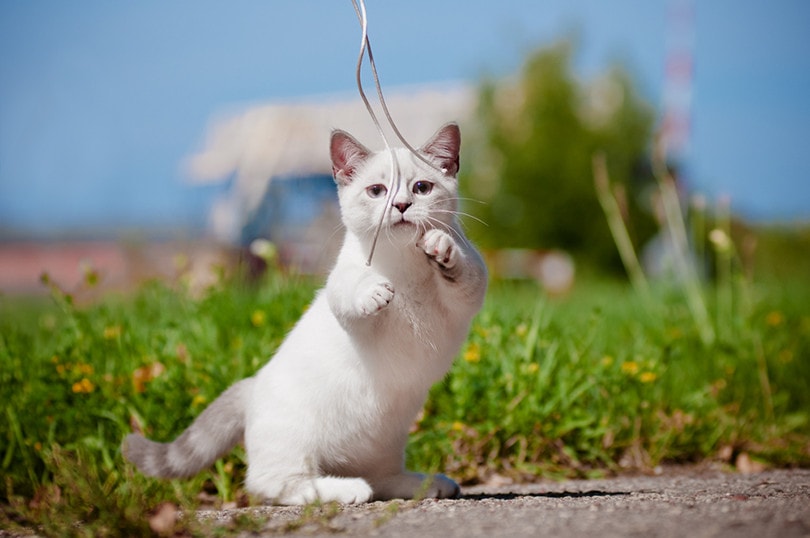
Click Below to Skip Ahead
Munchkin cats are some of the most adorable furry friends around. Their extra-short legs make them painstakingly cute. All the while, they have an affectionate and loving temperament that is perfect for practically all families.
Whether you have children or other pets in the household, Munchkin cats often fit in perfectly. They love to play, but they need a lot of attention and can be a bit mischievous. For the right family, a Munchkin cat is perfect.
Breed Overview
Height:
5 – 7 inches
Weight:
6 – 9 pounds
Lifespan:
12 – 15 years
Colors:
White, black, red, blue, lavender, cream, chocolate, cinnamon, fawn, lilac
Suitable for:
Families with children or pets; seniors
Temperament:
Playful, affectionate, and active
Overall, Munchkin cats are a great fit for large families or retirees who can provide a lot of attention for this social feline. In contrast, this breed is not a good choice for individuals who want a low-maintenance, peaceful companion that is independent and can be on its own for long periods.
Read on to learn more about this adorable cat breed and decide if a Munchkin is suitable for you and your home.
Munchkin Cat Characteristics
Munchkin Kittens

Munchkins are relatively new to the scene. In fact, they were only recognized by the International Cat Association in the early 2000s. Because they are so new and are a result of a rare genetic mutation, the kittens are pretty expensive.
The exact price will depend on the cat’s pedigree and breeder. Keep in mind that the price will not include all the first-time essentials you need for your cat. In addition to the kitten, you also have to pay for veterinary care, a litter box, food, and accessories.
Temperament & Intelligence of the Munchkin Cat
Munchkin cats are adorable for more than just their appearance. These cats are lovable, affectionate, and energetic. They are even intelligent and easy to train. Whether you have children, pets, or seniors living in your home, the Munchkin will likely get along with everyone.
Are These Cats Good for Families? 👪
Munchkin cats are fantastic for families. In fact, they are ideal for families. These cats are curious and love to play with children, adults, and other animals. Often, these cats are so curious that they will stand up on their back legs like a rabbit to see what’s going on above their line of vision.
These cats are highly social and are not ideal for individuals who plan to be away from home a lot since they will become mischievous when bored.
Although Munchkin cats get along great with children, it’s still a good idea to socialize them with your child from an early age. Likewise, teach your child how to behave around animals. That way, the kitten and your children can grow up to be best friends.
Does This Breed Get Along With Other Pets?
Unlike many other cats, Munchkins even get along with other pets. If you introduce the Munchkins from a young age, you can expect them to play with and cuddle up to other cats and dogs. So, you don’t have anything to worry about if you already have animals in the household.
Of course, make sure that the Munchkin is safe with the other pets, especially if you have big dogs. Take some time to introduce the pets to one another and monitor their behavior to ensure they get along before leaving them alone.
 Things to Know When Owning a Munchkin Cat:
Things to Know When Owning a Munchkin Cat:
As if Munchkin cats couldn’t get any cuter, they’re also surprisingly easy to take care of. Although you will need to buy quite a few toys for this adventurous kitty, they don’t need a lot to be happy and healthy.
Food & Diet Requirements
Munchkin cats need high-quality cat food and a constant supply of fresh water. Make sure that the bowls you buy for the food and water have low edges. That way, your Munchkin can easily access its food and water despite having such tiny legs.

Exercise 🐈
Munchkin cats are very active and energetic. Even though they have short legs, they love to run, jump, and play. These cats are high-energy animals, but they don’t need a lot of directed exercise. Instead, these kittens will get their energy out on their own.
To make sure that your cat is fully exercised and happy, invest in a lot of toys for your cat. Additionally, look for a cat tree with lower pedestals so that they can run and jump inside the house.
Training 🧶
Munchkins, despite their odd looks, are highly intelligent. They are easy to litterbox train and can be trained to fetch, do tricks, and even walk on a leash. Use positive reinforcement to train your Munchkin to do different tricks.
While training your Munchkin, watch out for your cat’s hoarding behaviors. Munchkins are known to squirrel away small objects, especially shiny ones. If items go missing around your home, it’s likely from your little Munchkin.
Grooming ✂️
Grooming your Munchkin cat will largely depend on the type of coat it has. Short coats will only need to be brushed once a week, but longer coats will need to be brushed every day or every other day. You can talk to your vet to determine what grooming is required based on your cat’s unique coat.

Health and Conditions 🏥
Munchkin cats are relatively healthy. They normally live to be 12–15 years old, but they can have certain health issues. They have the same health issues as any other breed, such as UTIs or pancreatitis.
One thing to keep in mind is that Munchkins must stay within a healthy weight. Because of their short legs, obesity can be very dangerous for these cats, even more so than for other breeds. Keep your cat healthy by opting for high-quality cat food and getting toys for the Munchkin to play with.
Currently, there is no research that suggests the mutation associated with the cat’s short legs causes any health issues. However, the breed is still young, which means there’s a lot more research to be done. Since the jury is still out on this breed, it’s imperative to talk to your vet regularly and make routine appointments.
Male vs. Female
There’s very little difference between male and female Munchkin cats. Both are small and affectionate. Females may be slightly more social since female cats are naturally more affectionate than males. Males are still highly social, though.
3 Little-Known Facts About the Munchkin Cat
1. They are their own breed
When most people first learn about Munchkin cats, they assume they are miniature versions of other breeds. This is not the case. Munchkin cats are their own unique breed because of the genetic mutation required to produce them.
In other words, Munchkin cats are not mini versions of other breeds. Instead, they are their own breed, but they come in many shades and colors.
2. They are compared to Dachshunds
Munchkin cats are often compared to Dachshunds, otherwise known as wiener dogs. This largely has to do with the short legs of both animals. Whereas Dachshunds are adorably referred to as wiener dogs, Munchkins are often referred to as sausage cats.
3. They come in nearly all coat types
Since Munchkin cats are defined by their leg length, not by their coat, Munchkins come in many colors and coat types. They can have short coats, long coats, or be completely hairless. They can also come in practically every color, but some of the most common shades include calico, tabby, gray, and black.

Final Thoughts
If you are looking for an adorable, intelligent, and affectionate cat, a Munchkin may be right for you. This cat can fit into practically any family where it gets a lot of attention and one-on-one time. Whether you have children or other pets, the Munchkin will fit in perfectly.
Do not get a Munchkin cat if you do not have the means to afford its expensive price tag. Likewise, do not get a Munchkin if you tend to be away from home a lot. This social cat needs interaction and social play that only big families and retired individuals can typically offer.
Related Reads:
- Lambkin Cat: Pictures, Care Guide, Temperament & Traits
- How Big Will My Munchkin Cat Get? Size + Growth Chart
Featured Image Credit: MDavidova, Shutterstock







